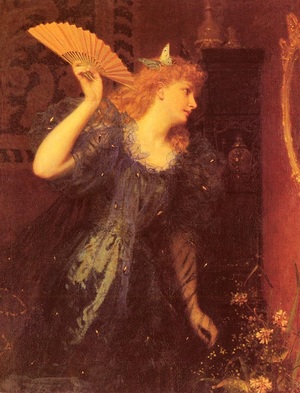|
E here... One of the paradoxes of Victorian society was how sentimental the Victorians could be (See Figure 1!) in their art, books, and music, and yet at the same time, how restrained they were in their personal relationships. This was the age of the "stiff upper lip." To "express yourself" or share your feelings with the world the way people do in our time would have been considered shockingly vulgar. Victorian people pride themselves on being dutiful and responsible, and you were viewed as lacking in those areas if you were overly emotional. So no matter how you actually felt, the correct way to behave was generally to hide it and just appear to be calm, cool, and even-steven. So while they covered every surface with cupids and tassels, flowers and curlicues, these folk prided themselves on maintaining a detached emotional state all of the time, no matter what the circumstances. Here's a perfect example of the stoic Victorian. A poor British officer serving in Africa during Victorian times awakens to find he is inexplicably missing a leg. No worries... Some think this restrained demeanor was a product or the new repressive public schools. Even when facing difficult times, tragedies, or even great moments of joy, the Victorians always tried to appear dignified. This even carried over into the arena of LOVE. I know, kids. Ewwww! Yuck! Love! Gross! I thought I would devote a little time to two ways that the emotionally stilted Victorian couples actually could manage to express their feelings without having to come out and say it--by using the Victorian language of flowers and fans. The Victorians used different flowers to convey certain messages for them. A very sophisticated flower language developed over the course of the early Victorian period. For example, if a Victorian dandy was smitten with a lovely young lady, he could send her an acacia flower to let her know that she has a secret admirer. She would spend many sleepless nights trying to figure out who sent such lovely flowers to her. If she is clever enough to figure it out, she could send him either back an ambrosia flower which carries the message that she is interested in him as well, or she could send a striped carnation which all Victorians knew meant take a hike crusty dude :( All this communicated without ever having to confront the other person face to face. And we thought we had it easy sending texts and emails! Roses, of course, have been a symbol of love for centuries, but the Victorians assigned meaning to each of the colors. For example: Blue Roses - means you have fallen hopelessly in love at first sight. Red Roses - means you have found your one true love. There will never be another. Red and White mixed - means we will always be together. Yellow Roses - means that I have once loved you, but now it is slowly withering away. Black Roses - means you are in love NO MORE! I suspect there were lots of times when someone got mixed up on the specific meaning and made a fool of themselves. Ha Ha!  Hmm, what does that mean? Photo credit Sophie Gengembre Anderson - Art Renewal Center – via Wikipedia Commons. Hmm, what does that mean? Photo credit Sophie Gengembre Anderson - Art Renewal Center – via Wikipedia Commons. The Victorian FAN language was another way a lady could communicate her feelings to a gentleman without ever having to say the words--and risk being overheard by her parent or chaperone, who would surely not approve of her sending such messages. A fan placed close to a lady's heart means that she is interested. (Of course, the guy has to be looking at her to get the message!) A fan held above the left ear means she is not interested. If she starts fanning herself very slowly, she is indicating that she is already taken. An open fan held in the left hand would send him the signal that she would like to get to know him better, while an open fan held in the right hand means you are too forward, back off. Seems a little confusing to me :/ I for one am glad I never had to learn the complicated language of flowers or the subtle language of the fan. I just walked straight up to "G" and asked her to dance with me a couple of decades ago. She has been foolish enough to hide her eyes behind an open fan ever since. [Hints on Fan Language here! http://delval.rscds.us/fan.html]
0 Comments
Leave a Reply. |
ADVENTURES IN
WRITING Welcome to our blog! Here we'll be sharing the constant surprises, delights, challenges and endless twists & turns of our lives as full-time novelists.
Join E.G. Foley’s Mailing ListSign up for News, Events, and Behind-the-Scenes Fun! Almost There!To complete your sign up, please go to your inbox and verify your email address. If you don't see the confirmation email, check your "Spam" folder or "Promotions" tab. Our Latest Release!
Archives
April 2024
|
|
© E.G. Foley 2023
|
 RSS Feed
RSS Feed




